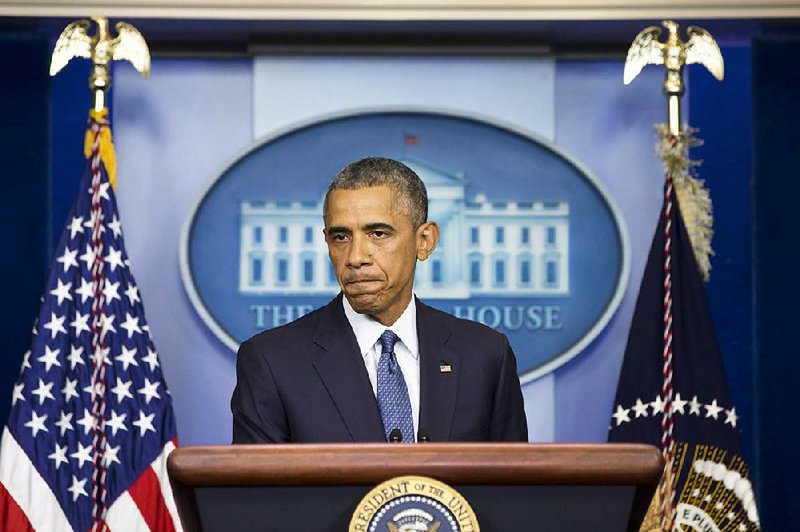WASHINGTON -- House Republicans approved legislation Friday that clears the way for the eventual deportation of more than 500,000 foreigners brought to the U.S. illegally as children and addresses the current surge of illegal aliens at the U.S.-Mexico border.
RELATED ARTICLE
http://www.arkansas…">Details sought on alien children
The border legislation passed in a 223-189 vote Friday night before lawmakers left Washington for a five-week recess. The four representatives from Arkansas, all Republicans, voted in favor of the bill.
President Barack Obama said Republicans made a bad bill worse and promised to veto the measure if it reaches his desk. He called it "the most extreme and unworkable version of a bill that they already know is going nowhere," and said he would have to act unilaterally to deal with the border crisis.
House Republicans made last-minute changes to two bills Friday, a day after leaders were forced to abandon a scheduled vote in the face of Tea Party opposition. That left the new leadership team cajoling reluctant lawmakers.
"We're in very good shape," Rep. Kevin McCarthy, R-Calif., the new majority leader, said before the vote.
The $694 million border security bill includes a new $35 million payment to reimburse Texas for National Guard troops deployed at the border by Gov. Rick Perry. It also revised a provision intended to speed the deportation of Central American children arriving at the border.
About 57,000 unaccompanied children -- most of them from El Salvador, Guatemala and Honduras -- were apprehended at the border from Oct. 1, through June 15, double the total from the same time a year earlier.
In the new proposal, leaders swapped out language aimed at expediting deportations of the Central American children by adopting an approach offered by Reps. John Carter of Texas, Jack Kingston of Georgia and Robert Aderholt of Alabama.
Carter's amended language would require a hearing in 14 days for Central American children who don't volunteer to be deported. The previous version required a hearing in seven days, which Carter said wouldn't be feasible. The changes also removed a provision that Carter said could have given Mexican children an increased chance of remaining in the U.S.
After the House vote, White House spokesman Josh Earnest said in a statement that the bill "does not responsibly address the problem of unaccompanied children apprehended at the border."
To appeal to hard-core immigration foes, Republicans also toughened a companion bill targeting the Deferred Action for Childhood Arrivals program, which President Barack Obama implemented in 2012 and Republicans blame for the current influx of illegal aliens.
That program allows some foreigners who were brought to the U.S. illegally as children to request deferred action on deportation proceedings if they meet certain criteria.
The bill, which passed in a 216-192 vote, says the president cannot renew or expand the program, according to several House Republicans. The representatives from Arkansas also supported the second bill.
"Overall there is a distrust of the president," said Rep. Blake Farenthold, R-Texas. "There's a concern about giving him wiggle room, and if you give him money, he'll do what he wants to with it."
Two of the fiercest immigration opponents -- Reps. Steve King, R-Iowa, and Michele Bachmann, R-Minn. -- said they were enthusiastically on board with the new legislation after meeting with the House leadership Thursday night. The conservative group Heritage Action urged members to back the bill.
"We got to yes," Bachmann said. "This is a tremendous accomplishment."
Democrats said Republicans made the bill more harmful to children to get votes from members aligned with the Tea Party and said it has no chance of becoming law while Obama is president.
"For Republicans to continue on this march because of the pressure of their far, far right means they aren't interested in getting things done," said Rep. Xavier Becerra, D-Calif.
Minority Leader Nancy Pelosi of California said before the vote that the Republican shift on the bill would cost what little Democratic support the measure had. Her members "didn't like it yesterday, now it's gone further to the right," she said.
Despite the House action, Obama's request for more money to deal with the crisis will go unanswered until at least September. The Senate blocked its version of a border security bill, and there are no plans to work out any compromise before Congress returns from a five-week recess.
Obama said the administration will have to shift funds to cover the costs of the border surge during the recess.
"We've run out of money," he said.
Emerging from a private GOP meeting earlier Friday, Rep. John Mica, R-Fla., rejected the notion that passing the bill would be a pointless exercise, since the Senate won't act.
"It'll be the template for what needs to be done, and also it might slow the president down," Mica said.
Moderate House Republicans were intent on returning home with a vote on the border crisis three months before midterm elections.
"The American people expect us to do our jobs," said Rep. Charlie Dent, R-Pa. "We have both a border and humanitarian crisis to deal with, and they expect us to take action now."
The Senate on Thursday blocked a $3.5 billion package, which included $2.7 billion to address the border issue, money for fighting Western wildfires and aid for Israel. Republicans and two Democrats -- Louisiana's Mary Landrieu and Joe Manchin of West Virginia -- opposed the bill, arguing that it amounted to a blank check for Obama with no policy changes.
The Senate vote was 50-44, short of the 60 votes necessary to move forward on the measure.
Congress did manage to pass a $16.3 billion bill Thursday to revamp the problem-plagued Department of Veterans Affairs and address the long wait times for health care for millions of veterans. The Senate approved the bill 91-3 and sent it to Obama for his signature.
The Senate also relented and backed the House's version of a bill providing $10.8 billion for highway and transit projects at the height of the summer construction season, sending it to the White House on Thursday night. The vote was 81-13 for the measure that funds programs through May.
But the failure of the House to pass the border security plan offered by the Republican leadership Thursday exposed bitter divisions within the GOP.
Conservatives in the House GOP caucus said they see it as a high point in their troubled relationship with House Speaker John Boehner of Ohio and his more centrist leadership team.
Bachmann described the retreat by Boehner as one of the highlights of her career because the leadership was forced to mostly capitulate to the conservative demands.
"Leadership knew they couldn't pass their bill," Bachmann said, and as a result were forced to agree to revisions offered by Tea Party members, led by King.
"We sat down in that room last night ... and it went as smooth as silk. Steve laid it out, and in less than two hours we worked it out," Bachmann said. "It was really a painless process. But it was the first time that I've seen leadership recognize, with respect and admiration, the work that Steve King did. Steve helped to completely gut this bill."
Bachmann, who will retire from Congress after this term, said the leadership's willingness to engage with the House's conservative flank Thursday night at a private gathering at the Capitol was startling and appreciated -- a moment she said that stands out as the rare occasion when the House leadership took direct cues from her and King.
"They recognized that this vote just wasn't going to happen," Bachmann said. "Steve wrote the comprehensive solution and the leadership pieced it together from his framework. They were willing, unbelievably and painlessly, to incorporate all of those changes, and now we have this bill."
Information for this article was contributed by Donna Cassata, Erica Werner, David Espo, Matthew Daly, Alan Fram, Stephen Ohlemacher and Andrew Taylor of The Associated Press; by Robert Costa of The Washington Post; and by Derek Wallbank, Erik Wasson, Richard Rubin, Roger Runningen, Kathleen Hunter, Peter Cook, Michael C. Bender, Roxana Tiron and James Rowley of Bloomberg News.
A Section on 08/02/2014

